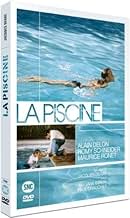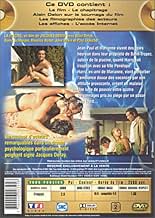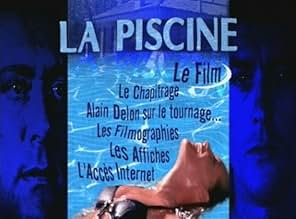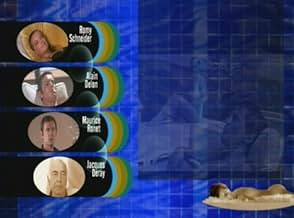Gli amanti Marianne e Jean-Paul trascorrono le loro vacanze in una villa sulla Costa Azzurra vicino a St-Tropez. Marianne invita il suo ex amante, Harry, e sua figlia adolescente a restare. ... Leggi tuttoGli amanti Marianne e Jean-Paul trascorrono le loro vacanze in una villa sulla Costa Azzurra vicino a St-Tropez. Marianne invita il suo ex amante, Harry, e sua figlia adolescente a restare. La tensione sale tra di loro.Gli amanti Marianne e Jean-Paul trascorrono le loro vacanze in una villa sulla Costa Azzurra vicino a St-Tropez. Marianne invita il suo ex amante, Harry, e sua figlia adolescente a restare. La tensione sale tra di loro.
- Regia
- Sceneggiatura
- Star
Maddly Bamy
- La mulâtre qui danse
- (as Madlybamy)
Steve Eckardt
- Fred
- (as Steve Eckart)
Stéphanie Fugain
- Une amie à la party
- (non citato nei titoli originali)
Recensioni in evidenza
The movie is languid and superficial and slow-moving but that's generally fine, if you feel like revisiting one of those archetypal, now almost forgotten, mildly (extremely mildly) titillating flicks which used to show up (dubbed) in the Adults Only slot on Friday late-night British TV in the late seventies. The earlier sequences glisten with tanned flesh, against which the slowly building tensions (Ronet and Schneider's past affair; Delon's attraction toward the daughter; Delon's relative failure as a writer and his realization that Ronet doesn't really like him) sometimes seem almost resonant. The movie becomes merely formulaic once it has to tie up the strands of the murder though - the only question being whether Schneider will stay with Delon or not, and it's clear at the end that this amounts to little more than the flip of a coin. Neither the writing nor the acting in the later stretches is sufficient to make very much out of this game of psychological cat and mouse.
Ignore the Naysayers, "La Pacine" is a masterful film. A true example of the kind of film they only really made in that area: vibrant and glossy, where a voyeuristic camera just hovers and lingers, putting the viewer right there. It reminded me a lot of Jean-Luc Godard's "Contempt." The way it is filmed makes the viewer want to be in that world, and stay there as long as possible. I know that South France in 1960's seems a hell of lot better than our world today. If "La Pacine" was 3 hours long, I would still sit through it, just to BE there.
I found the acting performances to be extraordinary. So much in this film is conveyed through body language and facial expressions, that one hardly even needs to know French (or read subtitles) to understand what it happening. Romy Schneider and Jane Birkin are both great to look at, and I thought Jane Birkin in particular really did well to say a lot with few words.
The only thing that slightly drags "La Pacine" down is that it's slightly overlong in the drawn out expository section after the climax, which causes the film to loose a bit of punch by the end. So come hang out by the pool for a while, I don't think you'll regret it.
I found the acting performances to be extraordinary. So much in this film is conveyed through body language and facial expressions, that one hardly even needs to know French (or read subtitles) to understand what it happening. Romy Schneider and Jane Birkin are both great to look at, and I thought Jane Birkin in particular really did well to say a lot with few words.
The only thing that slightly drags "La Pacine" down is that it's slightly overlong in the drawn out expository section after the climax, which causes the film to loose a bit of punch by the end. So come hang out by the pool for a while, I don't think you'll regret it.
It annoys me to read that a film has not aged well. A film is made in its day, the very next day some event may contradict its content. Suffice it to look at how very few in the younger generation accept that there was a pre-Internet and pre-mobile phone time, and how that has impacted on the cinema at large and their notion of the "olden days."
What LA PISCINE presents is a foursome: Jean-Paul (Delon) currently seeing Marianne (Schneider); a visiting pal, Harry (Ronet), who had dated Schneider until as recently as four years ago; and the latter's daughter, Penelope, played by the lovely Jane Birkin, here around the time that she sang the famous "Je t'aime... moi non plus" lovemaking duet with Serge Gainsbourg.
In real life, Delon and Schneider had been married until Delon knocked up Nathalie, splitting with the latter in 1967, and by mid-1968, when LA PISCINE was shot, they seemed ready to resume their relation. Alas, that did not work, and in the film you can see that even though they end up physically together, there is far too much baggage for those ties to hold.
After a frantically sexy start to the movie, we see Harry's arrival and it is immediately clear that Delon is not comfortable with Marianne's former lover around.
To thicken the tension, Harry has a very low opinion of Jean-Paul, who can feel it, and later receives confirmation of that perception from Penelope, who is less than impressed with her father's behavior, bringing in friends without warning, trying to rekindle his relation with Marianne in Delon's presence.
Delon looks fit, runs around like a cat on heat after the female that he beds with and possibly after Harry's 18 year old daughter (we never get to know whether J-P banged Pen, but both Marianne and Harry suspect it).
The animal in Delon is further aroused when Harry returns drunk from a night in the village, and in vino veritas, proceeds to tell Delon what he thinks of him, how useless he is as a writer and as just about everything else in life.
Delon, already annoyed over Harry's advances on the loyal Marianne, does not take well to criticism and snaps, willfully drowning Harry in the swimming pool, in a sequence that left me rather anxious and even scared, as Harry kept pleading for his life.
J-P, (played phenomally and efficiently by a Delon of menacing silences and stone-cold eyes), may be a cheap writer but he can take control of a situation slipping from him. He manages to elude the suspicious police inspector (competently played by Crauchet, who keeps returning with another question, as Falk's Columbo would do a decade later) and to get Marianne to stay with him... at least until film's end. As indicated earlier, there is far too much baggage weighing down their relation, and in fact both parties had previously stated their readiness to part company, until Delon senses the wisdom of keeping Romy sweet, given that the gumshoe might come back any time and turn up more evidence.
I am not particularly fond of Director Jacques Deray, who the following year would bungle BORSALINO, the only film ever to bring together Delon and Belmondo, but in LA PISCINE he makes good use of a psychologically perceptive script by Jean-Claude Carrière, extracts highly convincing performances from all in the small ensemble, even the maid, and the simple, unobtrusive exterior and interior cinematography by Jean-Jacques Tarbes works very effectively throughout.
LA PISCINE's sharp dialogue held my attention from beginning to end. You can expect sensuality, not physical action like fisticuffs... instead it comes in a burst of silent, dark, premeditated violence.
Recommended viewing. 8/10.
What LA PISCINE presents is a foursome: Jean-Paul (Delon) currently seeing Marianne (Schneider); a visiting pal, Harry (Ronet), who had dated Schneider until as recently as four years ago; and the latter's daughter, Penelope, played by the lovely Jane Birkin, here around the time that she sang the famous "Je t'aime... moi non plus" lovemaking duet with Serge Gainsbourg.
In real life, Delon and Schneider had been married until Delon knocked up Nathalie, splitting with the latter in 1967, and by mid-1968, when LA PISCINE was shot, they seemed ready to resume their relation. Alas, that did not work, and in the film you can see that even though they end up physically together, there is far too much baggage for those ties to hold.
After a frantically sexy start to the movie, we see Harry's arrival and it is immediately clear that Delon is not comfortable with Marianne's former lover around.
To thicken the tension, Harry has a very low opinion of Jean-Paul, who can feel it, and later receives confirmation of that perception from Penelope, who is less than impressed with her father's behavior, bringing in friends without warning, trying to rekindle his relation with Marianne in Delon's presence.
Delon looks fit, runs around like a cat on heat after the female that he beds with and possibly after Harry's 18 year old daughter (we never get to know whether J-P banged Pen, but both Marianne and Harry suspect it).
The animal in Delon is further aroused when Harry returns drunk from a night in the village, and in vino veritas, proceeds to tell Delon what he thinks of him, how useless he is as a writer and as just about everything else in life.
Delon, already annoyed over Harry's advances on the loyal Marianne, does not take well to criticism and snaps, willfully drowning Harry in the swimming pool, in a sequence that left me rather anxious and even scared, as Harry kept pleading for his life.
J-P, (played phenomally and efficiently by a Delon of menacing silences and stone-cold eyes), may be a cheap writer but he can take control of a situation slipping from him. He manages to elude the suspicious police inspector (competently played by Crauchet, who keeps returning with another question, as Falk's Columbo would do a decade later) and to get Marianne to stay with him... at least until film's end. As indicated earlier, there is far too much baggage weighing down their relation, and in fact both parties had previously stated their readiness to part company, until Delon senses the wisdom of keeping Romy sweet, given that the gumshoe might come back any time and turn up more evidence.
I am not particularly fond of Director Jacques Deray, who the following year would bungle BORSALINO, the only film ever to bring together Delon and Belmondo, but in LA PISCINE he makes good use of a psychologically perceptive script by Jean-Claude Carrière, extracts highly convincing performances from all in the small ensemble, even the maid, and the simple, unobtrusive exterior and interior cinematography by Jean-Jacques Tarbes works very effectively throughout.
LA PISCINE's sharp dialogue held my attention from beginning to end. You can expect sensuality, not physical action like fisticuffs... instead it comes in a burst of silent, dark, premeditated violence.
Recommended viewing. 8/10.
La piscine or The Swimming Pool is a French crime film, directed by Jacques Deray, who is known as a master of crime, and written by Jean-Claude Carriere; a long time companion of Luis Bunuel, for instance. La piscine isn't necessarily the most accessible French crime film but I would say it is one of the best, at least from the 1960's. It is an erotic, Antonionian film characterized by French existentialism. Although, it is not a perfect film, by any means, it is a surprisingly captivating and intriguing study on modern life as well as on alienation from the world and the society; loneliness, anxiety, love and freedom. The absurdity of being and the meaninglessness of life, how, in the end, nothing really matters.
The story happens somewhere in the French Riviera, where a couple is spending their holiday at a luxury château, borrowed from their friends. During the opening credits, we see reflections of nature on water: images of birds and trees. After the credits, the camera rises up and the water surface turns out to be a swimming pool, next to which there lies a man -- an insightful shot of the vacant and anguished life of the bourgeoisie. Everything was a lie; beauty and the happiness of life were only elusive reflections -- which happens to be the leading theme of Deray's film.
Soon we hear a woman shouting "Jean-Paul," and the man turns out to be Alain Delon. The woman (Romy Schneider) swims across the pool, comes to the man and they start kissing, fiercely. The physic happiness of this married couple is almost perfect. But details reveal pressures that begin to erupt, slowly, beneath the surface. In order to resist this anxiety, they make up the most shallow things for them to do and, therefore, invite a friend of theirs, Harry who surprisingly brings his 18-year-old daughter (Jane Birkin) with him. At a surprise party -- that resembles the party of The Night (1961) by Michelangelo Antonioni -- the pressures lead to tragic consequences.
La piscine strips seemingly beautiful and happy people down from their illusory facade. Jean-Paul turns out to be a failed writer whose fragile ego hides mysterious cruelty in it. On one level, he resembles Camus' Mersault as an apathetic and disregard man who has lost his lust for life. His wife, Marianne (Schneider) is, in turn, a prisoner of her emotions and is unable to free herself from the chains of her husband. Harry is good-looking and wealthy but, in reality, all of his relationships are elusive and mendacious. Nobody cares about him. His daughter, Penelope (Birkin) is a beautiful young woman who arises to her femininity but finds it hard to compete with Marianne.
Jacques Deray relays a competitive, jail-like vision of the lives of these characters. We see them behind bars, pillars and windows; trapped in an unending rat race. They are captivated like wild beasts, who are ready to kill each other at any second. Furthermore, all the characters are spying on each other: Jean-Paul keeps an eye on Marianne and Harry, for he thinks that they might have an affair. Harry, on the other hand, spies on Jean-Paul and Penelope because his juvenile father instincts can't bear a contestant. Marianne is also spying on them, because she thinks that she might lose the competition of Jean-Paul to a younger woman.
In the name of existentialist film, La piscine begins from nowhere and ends in somewhere which is quite the same. So why watch a film where nothing happens? Because, on the other hand, everything happens. Why read Kafka and watch Tarkovsky? For the very same reason. Although, La piscine is not a masterpiece, I would recommend it as an insightful film about loneliness and the illusion of idyllic life.
The story happens somewhere in the French Riviera, where a couple is spending their holiday at a luxury château, borrowed from their friends. During the opening credits, we see reflections of nature on water: images of birds and trees. After the credits, the camera rises up and the water surface turns out to be a swimming pool, next to which there lies a man -- an insightful shot of the vacant and anguished life of the bourgeoisie. Everything was a lie; beauty and the happiness of life were only elusive reflections -- which happens to be the leading theme of Deray's film.
Soon we hear a woman shouting "Jean-Paul," and the man turns out to be Alain Delon. The woman (Romy Schneider) swims across the pool, comes to the man and they start kissing, fiercely. The physic happiness of this married couple is almost perfect. But details reveal pressures that begin to erupt, slowly, beneath the surface. In order to resist this anxiety, they make up the most shallow things for them to do and, therefore, invite a friend of theirs, Harry who surprisingly brings his 18-year-old daughter (Jane Birkin) with him. At a surprise party -- that resembles the party of The Night (1961) by Michelangelo Antonioni -- the pressures lead to tragic consequences.
La piscine strips seemingly beautiful and happy people down from their illusory facade. Jean-Paul turns out to be a failed writer whose fragile ego hides mysterious cruelty in it. On one level, he resembles Camus' Mersault as an apathetic and disregard man who has lost his lust for life. His wife, Marianne (Schneider) is, in turn, a prisoner of her emotions and is unable to free herself from the chains of her husband. Harry is good-looking and wealthy but, in reality, all of his relationships are elusive and mendacious. Nobody cares about him. His daughter, Penelope (Birkin) is a beautiful young woman who arises to her femininity but finds it hard to compete with Marianne.
Jacques Deray relays a competitive, jail-like vision of the lives of these characters. We see them behind bars, pillars and windows; trapped in an unending rat race. They are captivated like wild beasts, who are ready to kill each other at any second. Furthermore, all the characters are spying on each other: Jean-Paul keeps an eye on Marianne and Harry, for he thinks that they might have an affair. Harry, on the other hand, spies on Jean-Paul and Penelope because his juvenile father instincts can't bear a contestant. Marianne is also spying on them, because she thinks that she might lose the competition of Jean-Paul to a younger woman.
In the name of existentialist film, La piscine begins from nowhere and ends in somewhere which is quite the same. So why watch a film where nothing happens? Because, on the other hand, everything happens. Why read Kafka and watch Tarkovsky? For the very same reason. Although, La piscine is not a masterpiece, I would recommend it as an insightful film about loneliness and the illusion of idyllic life.
A French drama; A story about crime in a sumptuous idyll. Still air. Mediterranean sun. One pool. Two lovers. Two guests. One is an old acquaintance to one and a former lover to another; the other is his daughter, a mystery to all. Hedonism, sensuality, eroticism, sexual longing, anxiety, and unfulfillment - it all leads to weakness for one and a dastardly deed. A film that is slow-moving and its drama as enervating as the heat over the villa could easily drain the energy of the viewer, but it is energising, and the camera loves these beautiful, chic people and the intrigue they create. The story is well written. The drama is well controlled.
Alain Delon's Top 10 Films, Ranked
Alain Delon's Top 10 Films, Ranked
To celebrate the life and career of Alain Delon, the actor often credited with starring in some of the greatest European films of the 1960s and '70s, we rounded up his top 10 movies, ranked by IMDb fan ratings.
Lo sapevi?
- QuizThe film reunited a 1960's "mythical couple' Alain Delon and Romy Schneider. Schneider had dramatically broken-up with Delon couple years earlier and married German director and actor Harry Meyen in Berlin. She had a child, but Delon never truly let go. He began pursuing her again soon after their split, attempting to reconcile despite her new life. His determination was evident when he insisted on her being cast in the film, even threatening to quit if she wasn't included-despite producer Gérard Beytout's misgivings, as he was dubious about the actress from the La principessa Sissi (1955) trilogy in a bikini. During and after filming, Delon continued his relentless pursuit, and though Schneider repeatedly refused, their undeniable emotional connection translated into palpable on-screen chemistry. His efforts to win her back persisted long after the film, spanning much of her life and adding an emotional depth to their real and cinematic legacy.
- BlooperA body of someone that has just drowned does not float on water. Only after the decaying process has started and gases build up in the body does the body float to the surface.
- Curiosità sui creditiThe opening credits shimmer, as though they were being projected onto the surface of the swimming pool.
- Versioni alternativeEnglish version. As all the cast, except Paul Crauchet, were fluent in English the scenes were shot both in French and in English. This version proves to be funny for the English-by-the-book used in the dialogue (obviously a line by line rendition of the original French script). The English version is also about ten minutes shorter with slightly different edit and has a few other differences (such as Romy Schneider wearing a bikini top in the English version in scenes where she is topless in the French version).
- ConnessioniFeatured in La vengeance du serpent à plumes (1984)
I più visti
Accedi per valutare e creare un elenco di titoli salvati per ottenere consigli personalizzati
- How long is The Swimming Pool?Powered by Alexa
Dettagli
- Data di uscita
- Paesi di origine
- Sito ufficiale
- Lingue
- Celebre anche come
- The Swimming Pool
- Luoghi delle riprese
- Ramatuelle, Var, Francia(villa and swiming pool at L'Oumède)
- Aziende produttrici
- Vedi altri crediti dell’azienda su IMDbPro
Botteghino
- Lordo Stati Uniti e Canada
- 211.467 USD
- Fine settimana di apertura Stati Uniti e Canada
- 3867 USD
- 16 mag 2021
- Lordo in tutto il mondo
- 332.120 USD
- Tempo di esecuzione2 ore 2 minuti
- Mix di suoni
- Proporzioni
- 1.66 : 1
Contribuisci a questa pagina
Suggerisci una modifica o aggiungi i contenuti mancanti


![Guarda Bande-annonce [OV]](https://m.media-amazon.com/images/M/MV5BNzFiYWQzZjAtYjQ2Ni00ZWIzLTk4OTctNzg0NTNiMjc2ZjlkXkEyXkFqcGdeQXRyYW5zY29kZS13b3JrZmxvdw@@._V1_QL75_UX500_CR0)


























